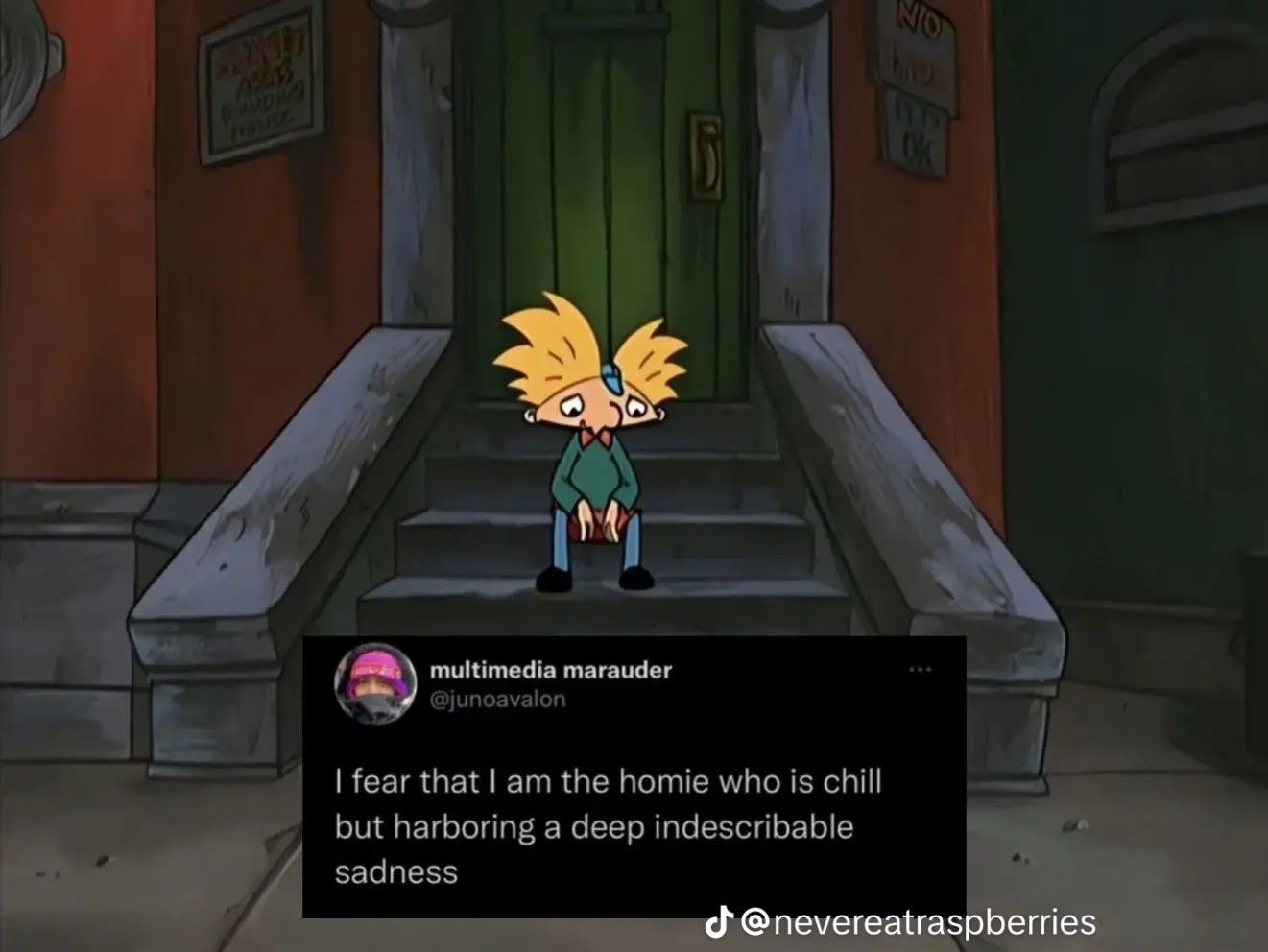WAYUT: The loneliness of emotional maturity
On the misconceptions of "having it all together."
Author’s Note:
I want to preface this by noting that I am in no way trying to humble-brag about being “emotionally mature.” I have no need to humble-brag. I’ll regular-brag about it: I consider myself an emotionally mature person. And, while I use “I” statements in this piece, I am writing with the hope that it resonates with many people, and doesn’t come across as self-aggrandizing. Okay? Alright. Let’s start.
I have been called “emotionally mature” more times than I can count. By 15, I had been dubbed the “Mom” friend of the group. Men love to use me as an emotional pit-stop (read: dumping ground) while they’re capital-G, capital-T Going Through something. I am no stranger to the concept of emotional maturity.
As a kid, I was proud to be labeled as mature. Generally, kids like feeling useful and more grown-up than they really are and, as someone who rarely felt good enough, being a caretaker to others was my way of being valuable, of being needed.
My natural compassion—a compassion which I think most of us are born with—therefore became a slightly manipulative tool. I lended an empathetic ear to the vulnerabilities and insecurities of others, yes, but I rarely shared the vulnerable parts of myself with people.
And so, a toxic exchange developed—the people in my life learned to come to me whenever they had any issues, while I learned that my own feelings, and my own problems, were entirely insignificant.
I learned that “emotional maturity” meant, in many ways, that I wasn’t allowed to be affected by anything at all. Ever.
Not a great lesson.
I don’t blame my younger self or others for how the dynamic evolved—I built those walls to protect myself because I was afraid to establish any real boundaries with the people in my life.
As I’ve gotten older, however, I’ve grated against the caretaking label. I grit my teeth whenever someone describes me as “emotionally mature” because, oftentimes, these labels reinforce isolating interactions.
This past month, for instance, I was describing an issue I was experiencing to one of my mom’s friends. I laid out the conflict, how I was feeling about it, and how I imagined the other person was feeling about it, and her response was basically “Wow! You’re handling that way better than I would at your age! :)”
And then the conversation ended.
I’m not angry about the way she responded—I don’t think her compliment is inherently bad, and I appreciate her recognizing that I’d taken time to consider my issue from a thoughtful place. But her comment didn’t necessarily make me feel very heard or seen.
My issues with being labeled as an Emotionally Mature Person are that people tend to assume because I handle a situation “well” means I am affected by it less and, in making that assumption, actually isolate me from being held in empathetic space. The Emotionally Mature Person doesn’t really need to be listened to or seen, do they? They can figure it out for themselves.
And it’s weird, because it should feel like a good thing, people lauding my emotional maturity. But it doesn’t feel good. It feels like I’m being written off. It feels lonely.
I think that’s my biggest gripe: that the irony of being labeled as “emotionally mature” means that I am so often kicked out of spaces which would allow me to be vulnerable. My compassion for others has somehow warped into a hyper-independence that has been forced onto me. And it is only with the help of my friends who have experienced similar labeling that I have learned it is important—and okay—for me to share how I feel.
Because the truth is that I feel. I feel and I feel and I keep feeling, and it is often embarrassing and uncomfortable. And even if I get to a point where I’ve sat with my feelings and come to a “mature” conclusion about them, the feelings themselves are messy. And they tunnel into me, burrowing and stuck, and it is my job, over and over again, to uproot my heart and weed out the pain.
And all I want when I show someone those uprooted feelings is for them to say It must have been hard to find those in yourself. It must have been hard to dig those all up.
When I’m struggling, as I’ve often found myself doing for the past six months, I don’t need adoration and I don’t need a nod of approval. For the love of God, I don’t need anyone telling me that I’m “handling everything so well” as if every boundary I set or uncomfortable emotion I feel is easy work for me (it isn’t).
What I need is to feel seen, to feel heard. What I need is permission to feel soft and small and so vulnerable it’s as if I could float away on the wind and you are here telling me you will tether me to the ground. You will hold me. What I need to know is that I am free, and I am held.







ugh Meg, this was wonderful and made me feel so seen! Stumbled upon your substack the other day when you shared it on Insta and I’m incredibly grateful that I did. Your words describe my experience with emotional maturity almost TOO perfectly 🥲 no one talks about how challenging it is to break free from the tethers of the role of caregiver